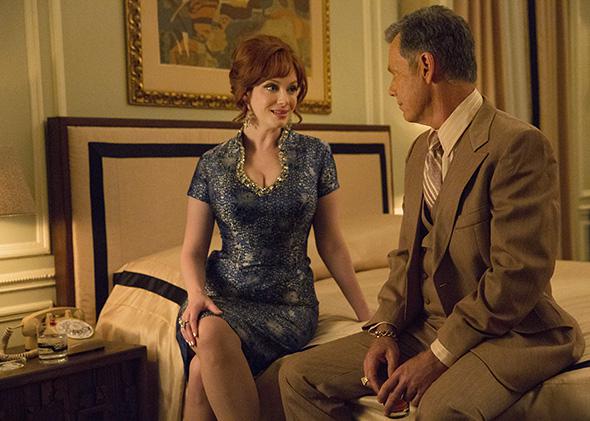You must really like French toast, Julia. I professed, before this half-season kicked off, to be totally Zen about the final run of episodes. This series has delivered enough joy to my life; they can end it however they wish. But for the second consecutive week, Mad Men left me hot under the collar. I liked this episode about as much as Richard likes toddlers. By the middle of it, I was more interested in the future of the Spurs-Clippers series, and it required the last full measure of my devotion to keep me from flipping from AMC to TNT.
It’s not that I disagree with your sharp interpretation, Julia; I think you’re right that this episode represented a pivot away from the bury-the-past mode of thinking and toward a new way of looking to the future. It’s that I found the writers’ approach to the subject heavy-handed and lacking in drama. For the second week in a row, a Mad Men episode has been stamped with a capital-T Theme, around which virtually all the action revolved: Last week it was Divorce, this week the Future. Rather than devise some narrative that might organically suggest Don’s wrestling with the question of what he wants from life now that the firm is on solid footing and he’s once again unburdened of wife and mortgage, we were instead subjected to his little listening tour of his colleagues. The effect was to turn those colleagues into mere props, not people. I didn’t get the sense that I was learning something about Peggy’s hopes and dreams in her interview with Don—the episode had reduced her to a foil for Don’s disillusionment with what a career in advertising has to offer. Cue shot of Don gazing out the window of his office looking for answers, like the Joe Biden of Madison Avenue.
The Peter Pan storyline, meanwhile, felt like it existed purely as a setup for Mathis’ rant. The whole thing rang hollow to my ears. For starters, how has Mathis lasted this long at the firm—he was introduced in Season 6, Episode 1—if he is this much of a dunce? I didn’t find his flameout funny, because it just felt too far-fetched to me—or perhaps I just don’t have enough of an investment in Mathis to find humor (or, for that matter, pathos) in his self-immolation. As for his valedictory tirade, I didn’t really buy that either. Sure, Don coasts on his looks and his charisma; that’s hardly a revelation to him or to us. He also, when he puts his mind to it, has a real knack for coming up with ideas for advertising campaigns and for selling them to the firm’s clients. What did we gain from seeing a character as inept as Mathis flail at doing things the Don way? It seemed like a waste of precious time to me and left me with little insight into our protagonist.
As for Joan’s meet-a-little-too-cute with Richard, I’m always happy to be in Joan’s company, and I admire Jim’s taste in bracelets. But I felt like I was being hammered with the same theme: Though Joan seems more contented in her job than Don, she’s looking for what comes next and trying to find a way to be true to her past while seeking fulfillment in the future. Richard, yet another new character trotted out at the 11th hour, is by necessity thinly sketched and felt like little more than a convenient occasion for Joan to struggle with how to balance old responsibilities with new opportunities. (Oh, and in case you didn’t catch the Theme of the Week, the rest of Joan’s screen time was given over to tut-tutting about Lou Avery, who hopes his future is with Hanna-Barbera, not Sterling Cooper. You see, his real passion lies in his avocation … even the D-plot was on message.)
I’m beginning to wonder whether padding out this final season into two seven-episode arcs, as opposed to a single 13-episode run, has had a negative effect on the show.* It’s felt to me the last two weeks like the writers had a plan for this last stretch—and that plan was no plan. I never expected the propulsive buildup of the final episodes of Breaking Bad, but I did expect more than this. Sunday night’s episode had shades of the worst elements of Mad Men Season 1, when the series was still finding its voice: bludgeoning the viewer with the big idea, harping on low-hanging symbols (the wine-dark stain in the otherwise empty apartment, with the world’s worst real estate agent hanging around to call attention to both), turning history into melodrama. The last was accomplished by revisiting a Season 1 plotline—Glen’s mooning for Betty—that I made the mistake of hoping we’d seen the last of. I’ve always admired the way Mad Men handled Vietnam, which has hummed menacingly in the background of the series while rarely intruding in ways you wouldn’t expect given the age and politics of its mostly well-heeled protagonists. Glen’s enlistment, by contrast, had the feeling of A Very Special Episode about a troubled boy going off to war, right down to Sally’s “But what about Kent State?” tantrum and Betty’s portentous tossing of Bobby’s tommy gun. Dun dun dun.
Can I go watch the Brady Bunch?
John
Read the previous entry by Julia Turner. Read the next entry by Hanna Rosin.
Correction, April 20, 2015: This piece originally described the final season of Mad Men as “two eight-episode arcs.” It consists of two seven-episode arcs.
